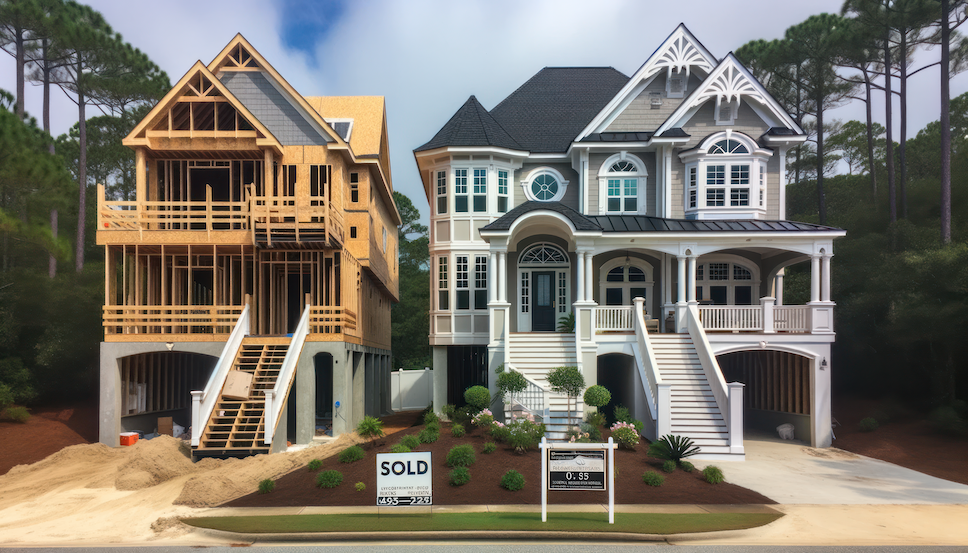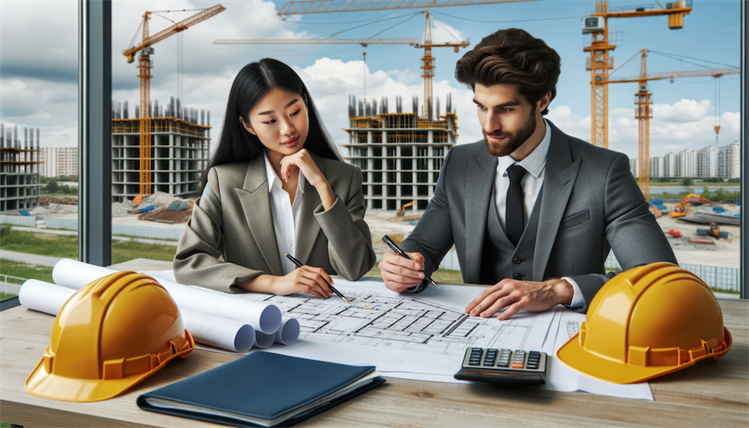When to Sell Your House When Building a New One: Steps to a Stress-Free Move

Building a new custom home while considering selling your current house is a significant decision involving many factors. It requires a strategic approach, balancing financial, legal, and personal considerations.
The ideal timing to sell your house when building a new one hinges on various factors including your financial health, market conditions, construction financing, and housing solutions during the transition. Assessing these aspects helps determine whether to sell your current home before or after the construction of your new one, ensuring a stress-free move.
We'll explore each of these crucial factors, offering insights into market dynamics, construction loans, legal compliance, and planning for a seamless transition. The goal is to provide you with a comprehensive understanding, enabling you to make a decision that aligns with your financial situation and personal readiness for this significant change. Continue reading for a detailed look at each step of this process.
Table of Contents:
| Section | Description |
| Financial Assessment | Understand your financial health before selling and building. |
| Market Dynamics | Grasp current real estate and construction market trends. |
| Construction Financing | Explore construction loans for financing your new home. |
| Legal Compliance | Navigate permits and zoning laws with builder expertise. |
| Seamless Transition | Plan for a smooth move and reflect on the rewarding journey. |
Assessing Your Financial and Personal Circumstances
Financial Health
Before embarking on the journey of selling your existing home and building a new one, it's important to have a clear understanding of your financial standing.
Assessing your credit score and savings can provide a solid foundation for making informed decisions.
- Credit Score: A higher credit score can qualify you for better loan terms.
- Savings: Having a substantial amount of savings can ease the transition financially.
Market Conditions
The current real estate and construction market trends can either favor or discourage your decision to build and sell. It's important to have a grasp of the local market conditions, as they will influence the sale price of your existing home and the cost of constructing a new one.
Personal Readiness
Transitioning from your current home to a custom-built one is both exciting and challenging. Are you ready for the change? Consider the emotional and practical aspects of this transition to ensure a smooth process.
Understanding Construction Financing

Construction Loans
Construction loans are a viable option that can facilitate the process of building your custom home.
Unlike traditional mortgages, construction loans provide the flexibility needed during the construction phase, before transitioning to a traditional mortgage once the home is completed.
- Interest Rates: Construction loans typically have higher interest rates but are short-term.
- Loan Amount: The loan amount is often based on the projected value of the completed home.
Additional Funding Avenues
Bridge Loans and Home Equity Loans
Apart from construction loans, alternative funding options such as bridge loans and home equity loans can be considered to bridge the financial gap during the transition.
- Bridge Loans: Help cover the costs during the transition period.
- Home Equity Loans: Allow homeowners to borrow against the equity in their current home.
The Timing Conundrum: Sell First or Build First?
Pros and Cons
The dilemma of whether to sell your current home before building the new one or vice versa has its own set of advantages and pitfalls. Here’s a comparative analysis:
| Factor | Selling First | Building First |
| Financial Stability | May provide immediate funds for construction. | Requires a solid financial plan to manage both processes simultaneously. |
| Housing during Transition | Requires temporary housing solutions. | Allows a seamless transition to the new custom-built home. |
| Market Conditions | Potentially advantageous if market conditions favor selling. | Beneficial if construction costs are stable or decreasing. |
Preparing Your Current Home for Sale

Home Improvements
Making minor improvements can significantly enhance the value of your current home. Consider tasks like:
- Painting
- Landscaping
- Minor repairs
Staging and Pricing
Proper staging and setting a competitive price are crucial for a successful sale. Utilize the contact page to get in touch with experts for advice.
Navigating the Housing Market
Market Dynamics
Understanding market dynamics is essential for timing the sale and starting the construction of your new custom home.
Choosing a Real Estate Agent
Selecting an agent who understands your goal of transitioning to a custom-built home can be a significant asset.
| Consideration | Description |
| Expertise | Choose an agent with experience in both real estate sales and new construction. |
| Understanding | Ensure the agent understands your goals and the local market conditions. |
| Communication | Effective communication between you, the agent, and your builder is key for a smooth transition. |
Overcoming Legal and Zoning Challenges
Permits and Zoning Laws
When embarking on the journey of constructing a custom home, being well-versed in the local permits and zoning laws is a necessity. Your partnership with Brandon Construction Group ensures a seamless navigation through these legal prerequisites, as their expertise in handling such matters is invaluable.
Housing Solutions During the Transition
Temporary Housing Options
The interval between selling your current home and moving into your new abode requires a temporary housing solution. Here are a few options:
- Rental Homes: A short-term rental agreement could provide a temporary haven.
- Extended Stay Hotels: These hotels offer the comfort of home for longer stays.
- Family and Friends: If feasible, a temporary stay with loved ones can also be a cost-effective solution.
Budgeting and Financial Planning for a Smooth Transition

Comprehensive Budgeting
A thorough budget is the backbone of a smooth transition. Emphasizing the long-term value and satisfaction of investing in a custom-built home can also provide a clearer financial perspective.
Financial Planning
Navigating through the financial aspects of this transition requires a solid plan. Simple tips like setting aside a contingency fund, monitoring your credit, and maintaining a steady income can be beneficial.
Ensuring a Seamless Move
Planning the Move
As the completion of your new home approaches, planning the move is crucial. A well-organized move can mitigate stress and keep the excitement of your new home alive.
- Inventory: List down all your possessions and decide what to take along.
- Packing: Start packing non-essential items early and label boxes clearly.
- Utilities: Ensure the transfer of utilities to your new address is scheduled.
Hiring Movers
Investing in reliable movers can ensure a smooth transition to your new home. Contacting us for recommendations on trustworthy movers in the area is a step towards a hassle-free move.
Conclusion: Embarking on Your Custom Home Journey
The path to your custom-built home is an exhilarating one, laden with personal touches and unique experiences. Are you ready to take the first step?
Reach out to the dedicated team at Brandon Construction Group or dial 910.262.8929 to kickstart this exciting venture today.
FAQs
1. Is it better to sell your home before buying another?
It is generally better to sell your home before buying another due to the financial flexibility and bargaining power it provides. Selling first can reduce the financial strain of carrying two mortgages at once and may offer more clarity on your budget for the new home. However, this approach can also require temporary housing if there's a gap between the sale and the next purchase.
2. Which month are most houses sold?
Most houses are typically sold in May and June. This trend is due to the favorable weather, which makes moving easier, and the timing aligns well for families looking to relocate without disrupting the school year. However, this can vary based on local market conditions and economic factors.
3. How long do you have to buy another house to avoid capital gains?
You have up to two years to buy another house to avoid capital gains tax under specific conditions, if you are using the IRS Section 1031 exchange, also known as a like-kind exchange. This rule allows you to defer capital gains tax if you reinvest the proceeds from the sale into a similar property. However, for a primary residence, the capital gains exclusion does not require the purchase of another home.
4. Can I transfer my mortgage to a new build?
Transferring a mortgage to a new build is typically not possible. Mortgages are secured by the property they were originally taken out for. However, some lenders may offer a 'portable' mortgage option, allowing you to transfer your existing mortgage to a new property, but this is subject to approval and may not be applicable to new builds.
5. Do you still pay a mortgage if you build a house?
You still pay a mortgage if you build a house, but the process differs from buying an existing home. Instead of a traditional mortgage, you would likely need a construction loan to cover the building costs, which then converts into a regular mortgage once the construction is complete.
6. Can I use my equity to buy another house?
You can use your equity to buy another house, often through a home equity loan or a home equity line of credit (HELOC). This allows you to borrow against the equity you've built up in your current home to finance the purchase of a new property.
